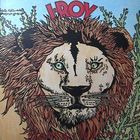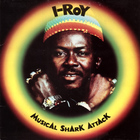I Roy

- Genre:
- Reggae
- Meta styles:
- DJ/Toasting, Dancehall, Roots Reggae
Roy Samuel Reid (28 June 1944 ? 27 November 1999, born in St. Thomas, Jamaica) better known as I-Roy was a Jamaican DJ who had a very prolific career during the 1970s. Deriving his name, and to some extent his style, from U-Roy, Reid was also heavily influenced in his early career by Dennis Alcapone. With early recordings for Gussie Clarke, Glen Brown, Lee Perry and Bunny Lee, Reid established himself at the forefront of 1970s reggae DJ's. His debut album Presenting I Roy is considered a classic of its genre, and was followed up by a series of strong albums including Hell and Sorrow.
Deriving his name, and to some extent his style, from U-Roy, Reid was also heavily influenced in his early career by Dennis Alcapone. With early recordings for Gussie Clarke, Glen Brown, Lee Perry and Bunny Lee, Reid established himself at the forefront of 1970s reggae DJ's. His debut album Presenting I Roy is considered a classic of its genre, and was followed up by a series of strong albums including Hell and Sorrow. Linton Kwesi Johnson dubs I-Roy "the mighty poet" in "Street 66" on the album, Bass Culture.
The mighty poet I-Roy was on the wire
Western did a skank; and each man laugh
an feelin Irie; dread I;
Street 66, the said man said
any policeman come ere
will get some righteous ras klaat licks
yeah man - whole heap kicks.
For several years from 1975, I-Roy engaged in an on-record slanging match with fellow DJ Prince Jazzbo, the two trading insults on successive singles, although in reality they were good friends. In 1976, I-Roy signed to Virgin Records with whom he would go on to release five albums.[1] On occasion he would utilise The Revolutionaries as his backing band.
One of I-Roy's earliest hits was in 1972 with "Sidewalk Killer," a take on Tommy McCook's original "Sidewalk Doctor." This 45 was produced by Ruddy Redwood.
Reggae's move to the dancehall era in the 1980s saw I-Roy's popularity decline. This decline in popularity and recurring health problems led to periods of homelessness during the later period of his life.
He died in 1999 of heart failure, at the age of fifty-five.
- Sort by

Heart Of A Lion (Vinyl)
- Year:
- 1977
- Tracks:
- 10
- Bitrate:
- 320 kbps

Musical Shark Attack (Remastered 2001)
- Year:
- 1976
- Tracks:
- 11
- Bitrate:
- 192 kbps
 Big Youth
Big Youth  Dennis Alcapone
Dennis Alcapone  Mad Cobra
Mad Cobra  Prince Far I
Prince Far I  Tony Rebel
Tony Rebel  Willi Williams
Willi Williams  Barrington Levy
Barrington Levy  Dillinger
Dillinger  Jah Woosh
Jah Woosh  leroy smart
leroy smart  Lone Ranger
Lone Ranger  Marcia Griffiths
Marcia Griffiths  Ninjaman
Ninjaman  TRINITY
TRINITY